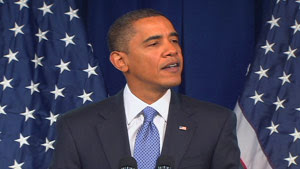 President Barack Obama has praised the bosses of Goldman Sachs and JP Morgan as "very savvy" and insisted he does not "begrudge" them their success and wealth, in a significant softening of the White House's attitude towards multimillion-dollar Wall Street bonuses.
President Barack Obama has praised the bosses of Goldman Sachs and JP Morgan as "very savvy" and insisted he does not "begrudge" them their success and wealth, in a significant softening of the White House's attitude towards multimillion-dollar Wall Street bonuses.Once a staunch critic of outsized pay packets, Obama adopted a strikingly consensual tone when asked this week about a $9m (£5.8m) bonus awarded to Goldman's Lloyd Blankfein and a $17m (£11m) payday granted to JP Morgan's Jamie Dimon.
"I know both those guys, they are very savvy businessmen," Obama said in a interview with Bloomberg's BusinessWeek magazine. "I, like most of the American people, don't begrudge people success or wealth. That is part of the free-market system."
Equating the banking bosses with top sports stars, Obama agreed that Dimon's $17m pay packet was "an extraordinary amount of money" in high-street terms, but added: "There are some baseball players who are making more than that and don't get to the World Series either, so I'm shocked by that as well."
Speaking more broadly about Wall Street rewards, Obama said: "I do think that the compensation packages that we've seen over the last decade at least have not matched up always to performance."
But he praised the fact that Goldman and JP Morgan were using long-term share awards, rather than cash, to pay bonuses to their senior executives. He said this "requires proven performance over a certain period of time as opposed to quarterly earnings", adding that it was a "fairer way of measuring CEO success and ultimately will make the performance of American businesses better".
Although the White House denied any changed in direction on the issue of bonuses, Obama's comments were far less strident than his past condemnations of rewards on Wall Street. Shortly after taking office last year, he described bonus payouts by banks as "the height of irresponsibility" and said it was "shameful" that banks were paying "lavish" compensation in the middle of an economic crisis.








